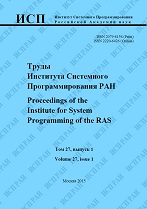|
Comparative analysis of frameworks for the performance evaluation of multi-tier cloud applications
G. R. Garaya, A. Tchernykhb, A. Yu. Drozdovc
a University of Camaguey
b CICESE Research Center
c Moscow Institute of Physics and Technology (State University)
Abstract:
In early stages of a hardware design, when a lot of options need to be considered quickly, analytic modeling is used. It allows the performance evaluation of proposed systems without requiring complex and costly detailed simulations. Analytical approaches for the performance evaluation of cloud computing environments include Queuing Theory and Control Theory models. Real-Time Calculus (RTC) is a high-level analysis technique previously proposed for stream-processing hard real-time systems and frequently used to evaluate trade-offs in packet stream processing architectures.The central idea of theModular Performance Analysis with RTC (MPA-RTC) is to build an abstract performance model of a system that bundles all information needed for performance analysis with RTC. In this paper, we address the performance evaluation of multi-tier clouds applications, and compare a Real-Time Calculus-based framework with two classical analytical approaches such as queuing theoretic approaches and control theoretic approaches. We focus on the capabilities of these alternatives for estimating the key Quality of Service parameter - the application response-time. In addition, we discuss the capabilities of each analytical approach for modeling other aspects of cloud computing environment such as workload models, task processing models, virtual machine (VM) provisioning, VMs performance interference, autonomic resource management, server consolidation, and cloud scaling strategies (horizontal and/or vertical). The capabilities of MPA-RTC as a valuable tool for the performance evaluation of cloud computing platforms are exposed.
Keywords:
Real-Time Calculus, queuing, control, QoS, response-time, cloud computing.
Citation:
G. R. Garay, A. Tchernykh, A. Yu. Drozdov, “Comparative analysis of frameworks for the performance evaluation of multi-tier cloud applications”, Proceedings of ISP RAS, 27:6 (2015), 199–224
Linking options:
https://www.mathnet.ru/eng/tisp194 https://www.mathnet.ru/eng/tisp/v27/i6/p199
|

| Statistics & downloads: |
| Abstract page: | 204 | | Full-text PDF : | 91 | | References: | 28 |
|




 Contact us:
Contact us: Terms of Use
Terms of Use
 Registration to the website
Registration to the website Logotypes
Logotypes









 Citation in format
Citation in format 